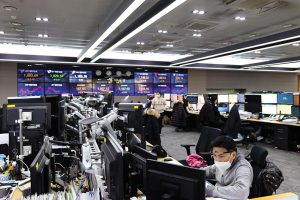BLOOMBERG
South Korea’s benchmark stock index fell, as a jump on November 6 triggered by the nation’s sudden ban on short-selling ran its course.
The benchmark Kospi finished 2.3% lower — while the small-cap Kosdaq Index slid 1.8% — after foreign and local institutional investors reduced equities. Kospi had surged 5.7% on November 6, its best performance since March 2020, after the regulator said the ban would last through June 2024.
The Korea Exchange temporarily issued its “sidecar” limit to halt sell orders for program trading after Kosdaq 150 futures plunged more than 6%, similarly repeating the limit that was issued for buy orders.
The policy change highlights the influence of the country’s retail investors, with many pushing for the ban by arguing the practice unfairly favors foreign and institutional investors.
Analysts though say the move is unlikely to lead to a sustained improvement in stocks given previous experiences going back to 2008.
November 6’s rally in the shares of companies targeted by short sellers may have obliged traders to close out bets on declines, exaggerating the move upwards.
“Short covering momentum could have been exhausted after sharp jumps on the first day of the short-selling ban,” said Han Jiyoung, an analyst at Kiwoom Securities Co. “As the previous day’s jump has been somewhat excessive, stocks with high short balance will inevitably see increased volatility.”
South Korea has banned short-selling, a practice where traders place sell orders for the stocks without owning or even borrowing them beforehand. The new rules forbid short-selling — which proponents argue lead to more liquidity and more accurate valuations — altogether.
Some heavily shorted electric-vehicle battery names that skyrocketed on November 6, including LG Energy Solution Ltd and Posco Holdings Inc, led the losses in the benchmarks on Tuesday.
“The ban may boost prices of a few specific stocks for a few days, but over the longer haul it will increase overall price volatility, reduce market liquidity and make pricing less efficient,” said Hyosung Kwon, an economist at Bloomberg Economics. “Even worse, it could discourage investment and further deepen the discount on South Korea’s stocks, hurting the retail investors it was supposed to protect.” South Korea has been seeking to have global index provider MSCI Inc move the country from its current emerging market status to developed market.
 The Gulf Time Newspaper One of the finest business newspapers in the UAE brought to you by our professional writers and editors.
The Gulf Time Newspaper One of the finest business newspapers in the UAE brought to you by our professional writers and editors.
